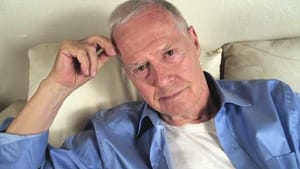Stay in the Loop
BSR publishes on a weekly schedule, with an email newsletter every Wednesday and Thursday morning. There’s no paywall, and subscribing is always free.
A composer who cares about words
Ned Rorem’s 90th at Curtis

Death being then the condition of life, we cannot love to live, if we cannot bear to die.
Five years ago, I quoted that line in a review of a Lyric Fest song program devoted to Philadelphia composers. It’s the last line of “Evidence of Things Not Seen,” a four-part song by Ned Rorem set to a text by William Penn. The song has become one of the major entries in my memories of all the vocal works that Lyric Fest has presented over the past decade.
"Evidence of Things Not Seen" is the title song in a mammoth 1997 song cycle that Rorem considers the magnum opus of a career primarily devoted to composing songs. This month Curtis celebrated the 90th birthday of one of its most distinguished teachers and graduates with a complete performance of this entire 86-minute work.
From Whitman to Frost
“Whatever my music is worth,” Rorem writes in his notes on the cycle, “I flatter myself that my taste in texts is first-rate.” He has every reason to feel that way.
Evidence of Things Not Seen is a small anthology of English and American poetry, containing 36 texts by poets like Whitman, Kipling, Yeats, Edna St. Vincent Millay, Auden, Oscar Wilde, Stephen Crane and Robert Frost, as well as English translations of Baudelaire and Colette.
It’s also an anthology of song technique. Rorem understands that the song cycle is a theatrical form that requires variety.
In one sequence, for example, Rorem moves from Walt Whitman’s account of a meeting in a bar room to Whitman’s “I am he that aches with love” and Millay’s “Love cannot fill the thickened lung with breath.” The first Whitman receives a quiet, conversational setting for baritone; the second is a flowing tenor aria that sounds like a call to worship; and the Millay parades in a honky-tonk tumult for alto.
Response to AIDS
Rorem never offers obvious harmonic effects in the songs that employ the whole quartet. Several of his settings pit a high, ringing soprano line against the rest of the foursome. In the title piece, he passes William Penn’s phrases from voice to voice, like a series of statements in which each member of the congregation supports the overall message and adds a personal comment.
Many composers create song settings in which the instrumental accompaniment is more musically interesting than the vocal line. Rorem’s piano accompaniments set moods and enhance the vocal parts, but his vocal writing is so creative that the singers occupy the center of attention throughout the entire long cycle.
The title piece is preceded, at the very end, by two long, moving texts explicitly dealing with the AIDS crisis. When I heard Lyric Fest perform the quartet as a stand-alone piece, I felt it had a serene, liturgical quality. In context, it becomes a much more intense response to death.
Older voices needed
This wasn’t a definitive performance of Rorem’s masterpiece. All four vocalists were Curtis students, and at times I felt the absence of older singers who might have produced subtler, more nuanced performances. The opening of Elizabeth Barrett Browning’s “How Do I Love Thee?”, for example, sounded florid to my ear.
But those were minor blemishes, at worst, and reflect my personal taste for understatement. The Curtis students and pianist Mikael Eliasen produced a major event. Music audiences deserve more opportunities to hear one of the masterworks of American music. Evidence of Things Not Seen can stand by itself, without a ceremonial excuse like a 90th birthday celebration.
What, When, Where
Curtis Presents: Rorem, Evidence of Things Not Seen. Rachel Sterrenberg, soprano; Lauren Eberwein, mezzo-soprano; Spencer Lang, tenor; Jarrett Ott, baritone; Mikael Eliasen piano. October 23, 2013 at Field Hall, Curtis Institute, 1726 Locust. (215) 893-7902 or www.curtis.edu.
Sign up for our newsletter
All of the week's new articles, all in one place. Sign up for the free weekly BSR newsletters, and don't miss a conversation.
 Tom Purdom
Tom Purdom